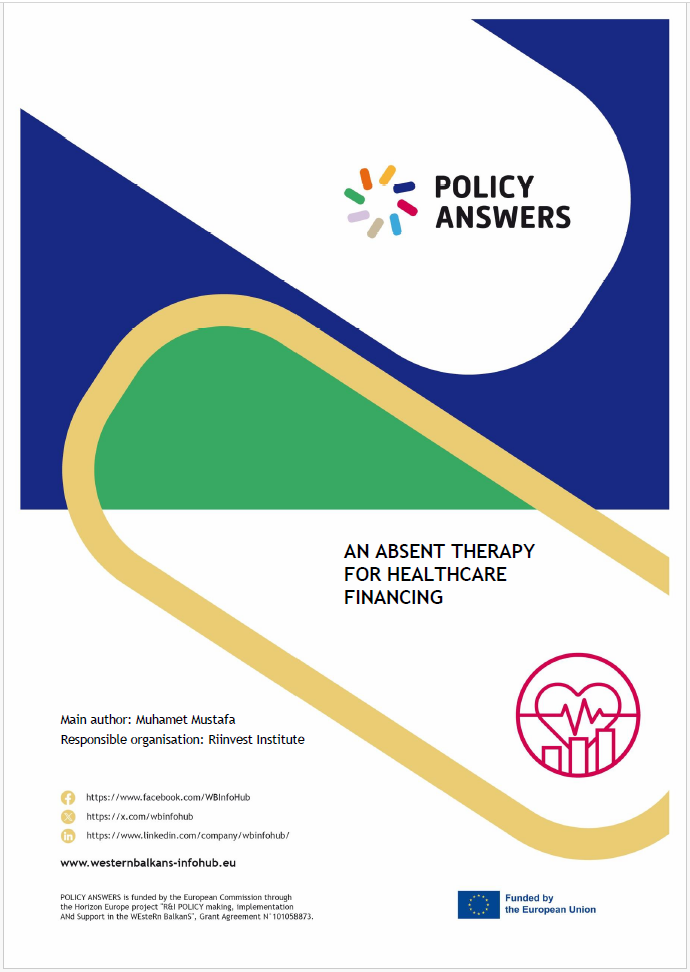This POLICY ANSWERS Brief was prepared in March 2024 by Muhamet Mustafa and published by the Riinvest Institute. This report addresses the chronic issue of insufficient health financing in Kosovo.
The objective is to argue the urgent need for a fundamental shift in addressing this problem. Despite the declared priority for healthcare in all post-war government programmes, this has never been achieved. Budgetary funds allocated to the healthcare sector have consistently ranged between 2.5 and 3.5 percent of Gross Domestic Product (GDP), approximately ten percent of Kosovo’s budget. This level of healthcare financing is significantly lower, not only compared to the European Union (EU) and OECD countries, but also in comparison to the Western Balkans (WB), except Albania (around three percent of GDP). Government spending on healthcare in Bosnia and Herzegovina reaches 6.5 percent of GDP, in Montenegro 6.5 percent, in Serbia 6.3 percent, and in North Macedonia 4.7 percent. The situation remains somewhat similar when analysing the financing of healthcare products and services through individual or family budgets (out-of-pocket expenses). This has negative consequences on the population’s well-being, the absorptive capacity for investments and human capital development, and the exploitation of the demographic dividend of Kosovo. This is particularly crucial at a time when birth rates are declining while having lower mortality rates and a smaller percentage of the population over 65 compared to the other the Western Balkans economies. The contribution of the healthcare sector to GDP growth and employment percentage remains much lower compared to EU and OECD countries.
Planned investments in the healthcare sector, although insufficient, are implemented at a low rate, especially when there is a pronounced need for investments in infrastructure and equipment. This creates difficulties for the Hospital and University Clinical Service of Kosovo (UHCSK) including regional hospitals, as well as at the primary level, to meet patient demands for services and exacerbates their need to seek these services in the private sector or institutions in the Western Balkans, as well as in Türkiye and EU countries, whether for diagnostic analyses or surgical interventions. The prices of healthcare services in the private sector in Kosovo, which have seen continuous increases, are unaffordable for the majority of Kosovo citizens’ household budgets. This significantly affects the standard of living for a considerable portion of the population and also results in the loss of a significant amount of funds that could have remained within the public healthcare sector. The non-functionality of the Health Insurance System and the Health Information System for nearly a decade and a half has also contributed to this situation. This could be a case study for inefficiency and poor management.
As a consequence of this situation and the level of salaries, the phenomenon of emigration of personnel, especially specialist doctors and nurses, has significantly increased in recent years. This emigration, particularly in certain sub-sectors, poses a considerable risk to the healthcare sector’s capacity to meet patient demands and the developmental needs of Kosovo.
Taking into account the findings of this report, the authors recommend the following:
1. The Kosovo Assembly and Government should increase the budget for this sector to at least the regional average level, which requires an increase in healthcare budget from 3.5 percent to around 6 percent of GDP within a period of one to three years;
2. Increase investments in infrastructure and equipment with specific interventions to overcome issues leading to long patient waiting lists due to equipment
shortages or other conditions;
3. The Ministry of Health and budgetary agencies within the sector should enhance budget management levels and ensure responsible and effective utilisation of allocated funds for this sector;
4. The Ministry of Health and healthcare institutions should establish and implement a human resources investment programme, especially for experts in specific fields, ensuring continuous specialisation and training, while also raising salaries to a level that prevents medical staff, especially those in high demand, from emigrating;
5. All relevant stakeholders, primarily the Ministry of Health, should take responsibility for the effective functioning of the Health Insurance System and interconnected with this, the Health Information System.

